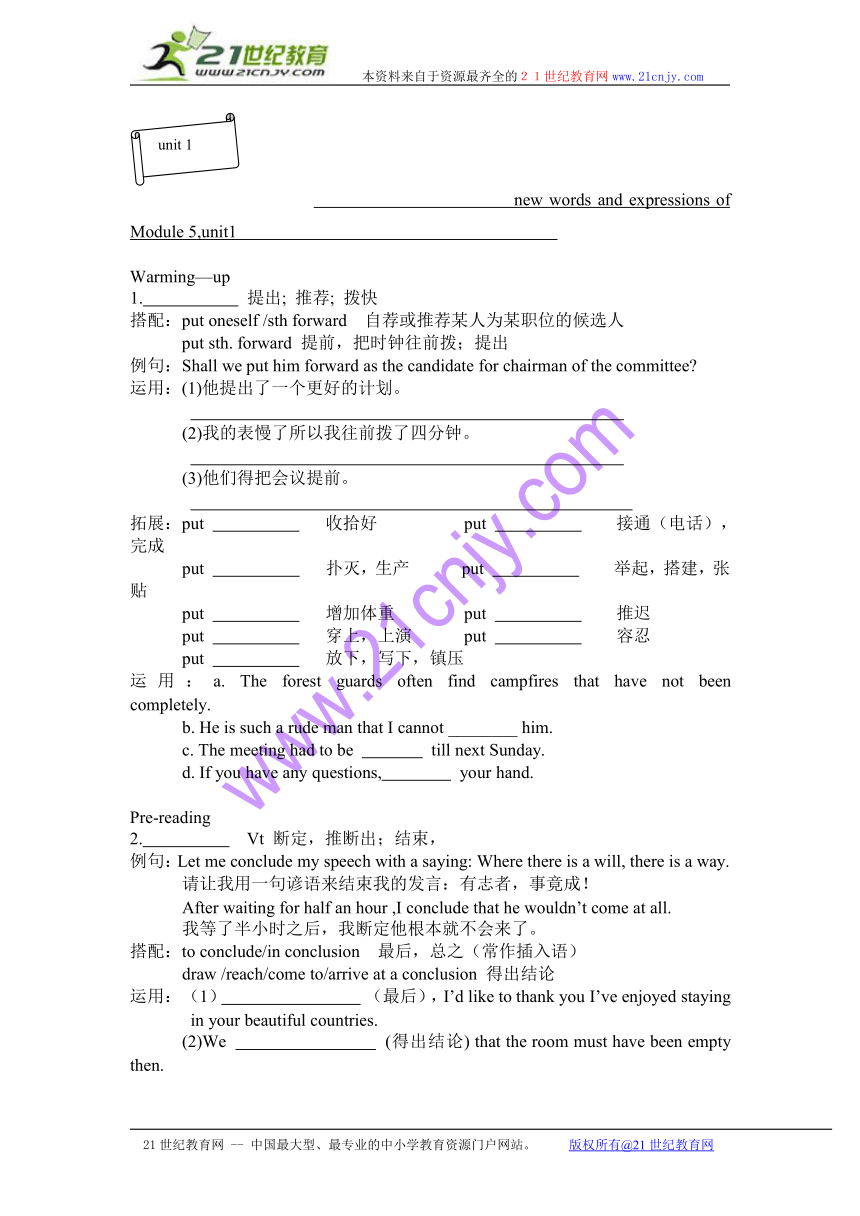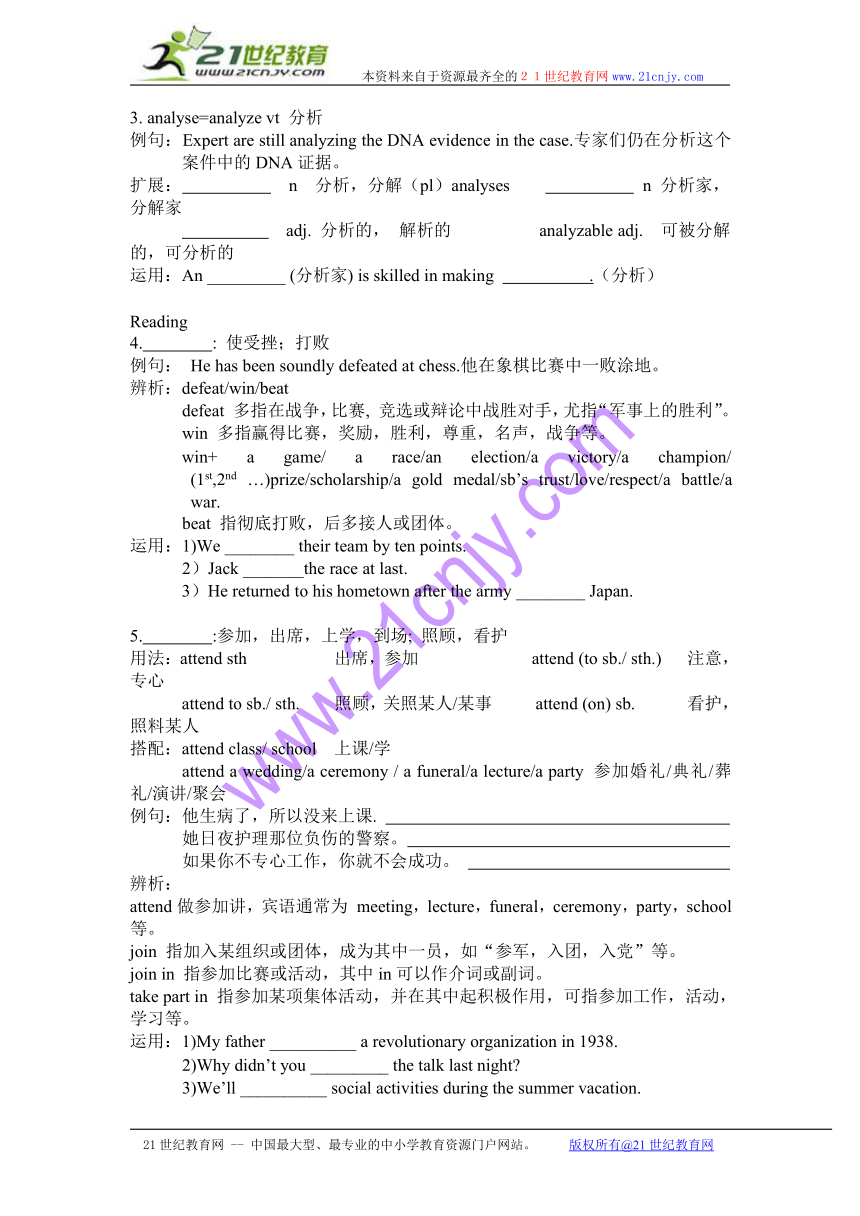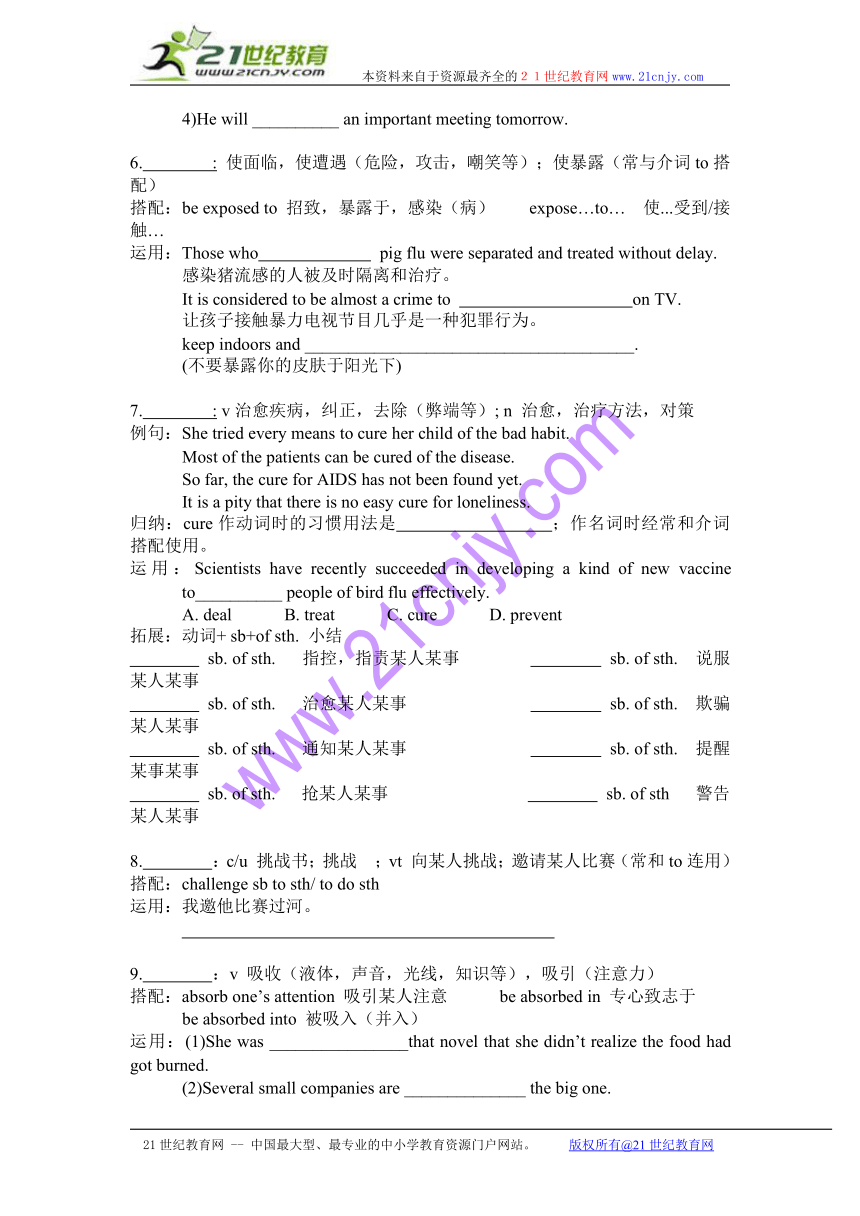Unit 1 Great Scientists 词汇详解
文档属性
| 名称 | Unit 1 Great Scientists 词汇详解 |  | |
| 格式 | rar | ||
| 文件大小 | 21.0KB | ||
| 资源类型 | 教案 | ||
| 版本资源 | 人教版(新课程标准) | ||
| 科目 | 英语 | ||
| 更新时间 | 2010-08-30 11:05:00 | ||
图片预览



文档简介
本资料来自于资源最齐全的21世纪教育网www.21cnjy.com
new words and expressions of Module 5,unit1
Warming—up
1. 提出; 推荐; 拨快
搭配:put oneself /sth forward 自荐或推荐某人为某职位的候选人
put sth. forward 提前,把时钟往前拨;提出
例句:Shall we put him forward as the candidate for chairman of the committee
运用:(1)他提出了一个更好的计划。
(2)我的表慢了所以我往前拨了四分钟。
(3)他们得把会议提前。
拓展:put 收拾好 put 接通(电话),完成
put 扑灭,生产 put 举起,搭建,张贴
put 增加体重 put 推迟
put 穿上,上演 put 容忍
put 放下,写下,镇压
运用:a. The forest guards often find campfires that have not been completely.
b. He is such a rude man that I cannot ________ him.
c. The meeting had to be till next Sunday.
d. If you have any questions, your hand.
Pre-reading
2. Vt 断定,推断出;结束,
例句:Let me conclude my speech with a saying: Where there is a will, there is a way.
请让我用一句谚语来结束我的发言:有志者,事竟成!
After waiting for half an hour ,I conclude that he wouldn’t come at all.
我等了半小时之后,我断定他根本就不会来了。
搭配:to conclude/in conclusion 最后,总之(常作插入语)
draw /reach/come to/arrive at a conclusion 得出结论
运用: (1) (最后),I’d like to thank you I’ve enjoyed staying in your beautiful countries.
(2)We (得出结论) that the room must have been empty then.
3. analyse=analyze vt 分析
例句:Expert are still analyzing the DNA evidence in the case.专家们仍在分析这个案件中的DNA证据。
扩展: n 分析,分解(pl)analyses n 分析家,分解家
adj. 分析的, 解析的 analyzable adj. 可被分解的,可分析的
运用:An _________ (分析家) is skilled in making .(分析)
Reading
4. : 使受挫;打败
例句: He has been soundly defeated at chess.他在象棋比赛中一败涂地。
辨析:defeat/win/beat
defeat 多指在战争,比赛, 竞选或辩论中战胜对手,尤指“军事上的胜利”。
win 多指赢得比赛,奖励,胜利,尊重,名声,战争等。
win+ a game/ a race/an election/a victory/a champion/ (1st,2nd …)prize/scholarship/a gold medal/sb’s trust/love/respect/a battle/a war.
beat 指彻底打败,后多接人或团体。
运用:1)We ________ their team by ten points.
2)Jack _______the race at last.
3)He returned to his hometown after the army ________ Japan.
5. :参加,出席,上学,到场; 照顾,看护
用法:attend sth 出席,参加 attend (to sb./ sth.) 注意,专心
attend to sb./ sth. 照顾,关照某人/某事 attend (on) sb. 看护,照料某人
搭配:attend class/ school 上课/学
attend a wedding/a ceremony / a funeral/a lecture/a party 参加婚礼/典礼/葬礼/演讲/聚会
例句:他生病了,所以没来上课.
她日夜护理那位负伤的警察。
如果你不专心工作,你就不会成功。
辨析:
attend做参加讲,宾语通常为 meeting,lecture,funeral,ceremony,party,school等。
join 指加入某组织或团体,成为其中一员,如“参军,入团,入党”等。
join in 指参加比赛或活动,其中in可以作介词或副词。
take part in 指参加某项集体活动,并在其中起积极作用,可指参加工作,活动,学习等。
运用:1)My father __________ a revolutionary organization in 1938.
2)Why didn’t you _________ the talk last night
3)We’ll __________ social activities during the summer vacation.
4)He will __________ an important meeting tomorrow.
6. : 使面临,使遭遇(危险,攻击,嘲笑等);使暴露(常与介词to搭配)
搭配:be exposed to 招致,暴露于,感染(病) expose…to… 使...受到/接触…
运用:Those who pig flu were separated and treated without delay.
感染猪流感的人被及时隔离和治疗。
It is considered to be almost a crime to on TV.
让孩子接触暴力电视节目几乎是一种犯罪行为。
keep indoors and ______________________________________.
(不要暴露你的皮肤于阳光下)
7. : v治愈疾病,纠正,去除(弊端等); n 治愈,治疗方法,对策
例句:She tried every means to cure her child of the bad habit.
Most of the patients can be cured of the disease.
So far, the cure for AIDS has not been found yet.
It is a pity that there is no easy cure for loneliness.
归纳:cure作动词时的习惯用法是 ;作名词时经常和介词 搭配使用。
运用:Scientists have recently succeeded in developing a kind of new vaccine to__________ people of bird flu effectively.
A. deal B. treat C. cure D. prevent
拓展:动词+ sb+of sth. 小结
sb. of sth. 指控,指责某人某事 sb. of sth. 说服某人某事
sb. of sth. 治愈某人某事 sb. of sth. 欺骗某人某事
sb. of sth. 通知某人某事 sb. of sth. 提醒某事某事
sb. of sth. 抢某人某事 sb. of sth 警告某人某事
8. :c/u 挑战书;挑战 ;vt 向某人挑战;邀请某人比赛(常和to连用)
搭配:challenge sb to sth/ to do sth
运用:我邀他比赛过河。
9. :v 吸收(液体,声音,光线,知识等),吸引(注意力)
搭配:absorb one’s attention 吸引某人注意 be absorbed in 专心致志于
be absorbed into 被吸入(并入)
运用:(1)She was ________________that novel that she didn’t realize the food had got burned.
(2)Several small companies are ______________ the big one.
(3)be lost in… 陷入…中,沉溺于某事中
______________, he almost ran into the car in front of him.
陷入沉思,他差点撞到前面的车上。
(4)I was so interested in these new ideas that I ________ them without thinking.
10. : v怀疑,认为是 n.嫌疑犯,可疑的人
用法:suspect +sb/sth 认为是某人、某事
suspect+that 怀疑……
suspect sb of sb/doing sth 怀疑某人是/做某事
运用:警察怀疑他是间谍。
我觉得他可能是对的。
11. : v.责备
搭配:blame sb. for sth. 因为某事责备某人 blame sth. on sb. 把…归咎于某人
to be blame (for sth.) 某人(因为某事)要受到责备 lay/put blame on 把 …. 归咎于
take the blame for sth. 承担…的责任
运用:(1) The diver didn’t know who ____________ for starting the fire
(2)___________________ his partner. =He___________ his partner __________.
他把他的失败归咎于他的搭档。
12. :污染
搭配:pollute environment/ air /water/river/soil
联想: : n 污染 : n 污染物
运用:1)这条河已经被工厂排放的废物污染 。
2)这是一部毒害青年人的心灵的暴力电影。
13. : v.处理,操纵;n. 柄,门把手
用法:1)门的把手断了。
2)我不知道如何对付这些人。
3)他会操纵这台机器。
14. : 除此之外,另外
比较:In addition to 除了…之外(还有)(=besides, as well as, apart from)
例句:Morning is the best time for study, in addition ,early rising can give you an exercise chance.
He speaks French well, in addition to English.
运用:1) giving a general instruction to computers, the course also provides practical experience.
A .In addition B In addition to C. Except for D. For the sake of
2) The teacher devoted herself to teaching. she helped those who had trouble in paying for the tuition.
A. In addition B. In particular C. In fact D. In case
15. : v/n 连接
例句:After investing ,they linked the accident to speed driving.
调查后他们把事故与快速驾车联系起来。
搭配 link…to… 把…和…连接起来 ( 该短语常用于被动结构)
link up 连接起来
bine…. …
unite……. … join……. …
16. : vt 宣布,宣告
例句:a. Please announce to your class that there will be no school tomorrow.
b. It has been announced that a new railway will be built through that city.
发散: :n 宣布,通知 :n 播音员,广播员
辨析:announce/declare
announce指正式公布,宣布,侧重预告人们关心或感兴趣的事情,尤指新闻。
declare指正式向公众宣布,侧重“当众发表”,多用于宣战,议和或宣判等。
1).China has _______ war on Japan.
2).Gathering clouds_______ the coming storm.
3).The government _______ its new economic policies to the public on TV.
A. declared B. turned out C. connected D. announced
17. :v命令;教导
例句:他命令我们原地不动。 He instructed that we all___________ where we were.
我们受到指示不得说出那件事。 We were instructed about it.
我叔叔教别人开汽车。 My uncle instructed people how .
政府指令手机短信要严格控制。
The government instructs that mobile text message .
总结:命令某人(不)做某事 ;在某方面指导某人 ; 指导某人做某事 ;instruct 表示“命令”时,后面的宾语从句要用 。谓语动词要用 ,should可以省略。
运用:Mr. Dans determined to hire a teacher to ________ her daughter in paper—cut art.
A. teacher B. introduce C. instruct D. direct
Learning about language
18. : v 捐助,捐献,投稿; 对…有贡献,有助于(常和介词to搭配使用)
例句:Most people contributed some money to/towards the new church.
大多数人都为新教堂捐献了一些钱。
A proper amount of exercise contributes to good health.
适度的运动有益健康。
扩展:contribute to 有助于,促使 make a contribution /contributions to sth. 对…做贡献
运用:1) 他每年给慈善事业捐出十万美元。
2) 大量新鲜空气有助于健康。
3)科学家为科学的发展做出了巨大的贡献。
19. :除…之外;此外
用法:a. 除了….以外(还有)(相当于besides);除了….以外(没有)(相当于except)
Apart from my parents, I have no one to believe in.(相当于except)
Everyone in our class went to the cinema apart from Mary. (相当于besides)
b. 此外,除掉(相当于except for)
I think you really have an artist gift apart from this defect.
除了这个缺陷外,我觉得你确实有艺术天赋
辨析: besides/except/except for/apart from
1)besides是 “除了…以外(还有)” 的意思,有肯定的附加意义,表示在整体中加上一部分,除去的部分包括在内,是包容关系。Besides还可作副词,表示“另外”,相当于in addition
如: We all went besides the girls.除了姑娘们去之外,我们也都去了。
Besides,you have to promise me one thing.
2)except 是“除了…以外(没有)”的意思,表示在整体中减去一部分,除去的部分要排除在外,是排除关系。前后名词性质相同。
如:We all went except the girls.除了姑娘们没去,我们都去了。
3)except for 意思是“除…之外”,用于引述细节以修正和补充句子的主要意思。前后名词性质不相同。
如:Your composition is well written except for a few spelling mistakes.
4)apart from 具有多重意义,即可表示besides,也可表示except 或except for。
如:what do you like eating apart from (besides) apples
I like doing sports apart from (except ) running.
运用:1)Your compositions are well written _______ Jim’s.
2)The hurricane damaged many houses and business building; _______ , it caused 30 deaths.
3)The bus is empty _______ an old lady
4)___________ the ending, it’s a really good film.
拓展:in ___ ____ 事实上,实际上 in _____ __ ___ 作为回报
in ____ _ __ 以防,如果 in _________ __ 赞成
in _____ _ _ 寻找 in ________ ___ 依次,轮流
in ____ _ __ 最终,最后 in ________ ___ 亲自,本人
in _____ _ _ 总之 in _______ ___ 共同,共有
in __ ___ __ 详细地 in _______ ___ 特别是
in _____ _ _ 依某人看来 in ________ ___ 公开地
in _____ _ _ 向…表示敬意
Using language
20. :adj. 严格的,严厉的的
例句My mother is very strict with me with in my study.
搭配:对某人要求严格 在…方面严格要求
21. : (lead-led-led): 通向;导致
例句:a. The road leads to the foot of the hill.
b. Success lies in hard work while laziness can lead to failure.
运用:1)条条大路通罗马。
2)正是严重的水污染使得成千上万的人死亡。
联想: cause, bring about, result in, contribute to
搭配: lead sb. to somewhere 领着某人去某处
lead sb in doing sth 带领某人做某事
lead sb to do sth 导致某人做某事
22. :有意义,讲得通
例句:No matter how I tried to read it, the sentence didn’t make sense to me.
扩展:make no sense 没有道理,没意义 make sense of 理解,明白
运用:1)这些指令没意义。
2)你能听懂他的话吗?
23. :v. 拒绝,不接受,抛弃
搭配:reject an offer of help
a rejected suitor
辨析:reject 后只能接名词,并暗含对被拒绝的东西不屑一顾,看不起。
refuse 后接名词还可接不定式,不含感彩,所以表示谢绝时用refuse。
unit 1
21世纪教育网 -- 中国最大型、最专业的中小学教育资源门户网站。 版权所有@21世纪教育网
new words and expressions of Module 5,unit1
Warming—up
1. 提出; 推荐; 拨快
搭配:put oneself /sth forward 自荐或推荐某人为某职位的候选人
put sth. forward 提前,把时钟往前拨;提出
例句:Shall we put him forward as the candidate for chairman of the committee
运用:(1)他提出了一个更好的计划。
(2)我的表慢了所以我往前拨了四分钟。
(3)他们得把会议提前。
拓展:put 收拾好 put 接通(电话),完成
put 扑灭,生产 put 举起,搭建,张贴
put 增加体重 put 推迟
put 穿上,上演 put 容忍
put 放下,写下,镇压
运用:a. The forest guards often find campfires that have not been completely.
b. He is such a rude man that I cannot ________ him.
c. The meeting had to be till next Sunday.
d. If you have any questions, your hand.
Pre-reading
2. Vt 断定,推断出;结束,
例句:Let me conclude my speech with a saying: Where there is a will, there is a way.
请让我用一句谚语来结束我的发言:有志者,事竟成!
After waiting for half an hour ,I conclude that he wouldn’t come at all.
我等了半小时之后,我断定他根本就不会来了。
搭配:to conclude/in conclusion 最后,总之(常作插入语)
draw /reach/come to/arrive at a conclusion 得出结论
运用: (1) (最后),I’d like to thank you I’ve enjoyed staying in your beautiful countries.
(2)We (得出结论) that the room must have been empty then.
3. analyse=analyze vt 分析
例句:Expert are still analyzing the DNA evidence in the case.专家们仍在分析这个案件中的DNA证据。
扩展: n 分析,分解(pl)analyses n 分析家,分解家
adj. 分析的, 解析的 analyzable adj. 可被分解的,可分析的
运用:An _________ (分析家) is skilled in making .(分析)
Reading
4. : 使受挫;打败
例句: He has been soundly defeated at chess.他在象棋比赛中一败涂地。
辨析:defeat/win/beat
defeat 多指在战争,比赛, 竞选或辩论中战胜对手,尤指“军事上的胜利”。
win 多指赢得比赛,奖励,胜利,尊重,名声,战争等。
win+ a game/ a race/an election/a victory/a champion/ (1st,2nd …)prize/scholarship/a gold medal/sb’s trust/love/respect/a battle/a war.
beat 指彻底打败,后多接人或团体。
运用:1)We ________ their team by ten points.
2)Jack _______the race at last.
3)He returned to his hometown after the army ________ Japan.
5. :参加,出席,上学,到场; 照顾,看护
用法:attend sth 出席,参加 attend (to sb./ sth.) 注意,专心
attend to sb./ sth. 照顾,关照某人/某事 attend (on) sb. 看护,照料某人
搭配:attend class/ school 上课/学
attend a wedding/a ceremony / a funeral/a lecture/a party 参加婚礼/典礼/葬礼/演讲/聚会
例句:他生病了,所以没来上课.
她日夜护理那位负伤的警察。
如果你不专心工作,你就不会成功。
辨析:
attend做参加讲,宾语通常为 meeting,lecture,funeral,ceremony,party,school等。
join 指加入某组织或团体,成为其中一员,如“参军,入团,入党”等。
join in 指参加比赛或活动,其中in可以作介词或副词。
take part in 指参加某项集体活动,并在其中起积极作用,可指参加工作,活动,学习等。
运用:1)My father __________ a revolutionary organization in 1938.
2)Why didn’t you _________ the talk last night
3)We’ll __________ social activities during the summer vacation.
4)He will __________ an important meeting tomorrow.
6. : 使面临,使遭遇(危险,攻击,嘲笑等);使暴露(常与介词to搭配)
搭配:be exposed to 招致,暴露于,感染(病) expose…to… 使...受到/接触…
运用:Those who pig flu were separated and treated without delay.
感染猪流感的人被及时隔离和治疗。
It is considered to be almost a crime to on TV.
让孩子接触暴力电视节目几乎是一种犯罪行为。
keep indoors and ______________________________________.
(不要暴露你的皮肤于阳光下)
7. : v治愈疾病,纠正,去除(弊端等); n 治愈,治疗方法,对策
例句:She tried every means to cure her child of the bad habit.
Most of the patients can be cured of the disease.
So far, the cure for AIDS has not been found yet.
It is a pity that there is no easy cure for loneliness.
归纳:cure作动词时的习惯用法是 ;作名词时经常和介词 搭配使用。
运用:Scientists have recently succeeded in developing a kind of new vaccine to__________ people of bird flu effectively.
A. deal B. treat C. cure D. prevent
拓展:动词+ sb+of sth. 小结
sb. of sth. 指控,指责某人某事 sb. of sth. 说服某人某事
sb. of sth. 治愈某人某事 sb. of sth. 欺骗某人某事
sb. of sth. 通知某人某事 sb. of sth. 提醒某事某事
sb. of sth. 抢某人某事 sb. of sth 警告某人某事
8. :c/u 挑战书;挑战 ;vt 向某人挑战;邀请某人比赛(常和to连用)
搭配:challenge sb to sth/ to do sth
运用:我邀他比赛过河。
9. :v 吸收(液体,声音,光线,知识等),吸引(注意力)
搭配:absorb one’s attention 吸引某人注意 be absorbed in 专心致志于
be absorbed into 被吸入(并入)
运用:(1)She was ________________that novel that she didn’t realize the food had got burned.
(2)Several small companies are ______________ the big one.
(3)be lost in… 陷入…中,沉溺于某事中
______________, he almost ran into the car in front of him.
陷入沉思,他差点撞到前面的车上。
(4)I was so interested in these new ideas that I ________ them without thinking.
10. : v怀疑,认为是 n.嫌疑犯,可疑的人
用法:suspect +sb/sth 认为是某人、某事
suspect+that 怀疑……
suspect sb of sb/doing sth 怀疑某人是/做某事
运用:警察怀疑他是间谍。
我觉得他可能是对的。
11. : v.责备
搭配:blame sb. for sth. 因为某事责备某人 blame sth. on sb. 把…归咎于某人
to be blame (for sth.) 某人(因为某事)要受到责备 lay/put blame on 把 …. 归咎于
take the blame for sth. 承担…的责任
运用:(1) The diver didn’t know who ____________ for starting the fire
(2)___________________ his partner. =He___________ his partner __________.
他把他的失败归咎于他的搭档。
12. :污染
搭配:pollute environment/ air /water/river/soil
联想: : n 污染 : n 污染物
运用:1)这条河已经被工厂排放的废物污染 。
2)这是一部毒害青年人的心灵的暴力电影。
13. : v.处理,操纵;n. 柄,门把手
用法:1)门的把手断了。
2)我不知道如何对付这些人。
3)他会操纵这台机器。
14. : 除此之外,另外
比较:In addition to 除了…之外(还有)(=besides, as well as, apart from)
例句:Morning is the best time for study, in addition ,early rising can give you an exercise chance.
He speaks French well, in addition to English.
运用:1) giving a general instruction to computers, the course also provides practical experience.
A .In addition B In addition to C. Except for D. For the sake of
2) The teacher devoted herself to teaching. she helped those who had trouble in paying for the tuition.
A. In addition B. In particular C. In fact D. In case
15. : v/n 连接
例句:After investing ,they linked the accident to speed driving.
调查后他们把事故与快速驾车联系起来。
搭配 link…to… 把…和…连接起来 ( 该短语常用于被动结构)
link up 连接起来
bine…. …
unite……. … join……. …
16. : vt 宣布,宣告
例句:a. Please announce to your class that there will be no school tomorrow.
b. It has been announced that a new railway will be built through that city.
发散: :n 宣布,通知 :n 播音员,广播员
辨析:announce/declare
announce指正式公布,宣布,侧重预告人们关心或感兴趣的事情,尤指新闻。
declare指正式向公众宣布,侧重“当众发表”,多用于宣战,议和或宣判等。
1).China has _______ war on Japan.
2).Gathering clouds_______ the coming storm.
3).The government _______ its new economic policies to the public on TV.
A. declared B. turned out C. connected D. announced
17. :v命令;教导
例句:他命令我们原地不动。 He instructed that we all___________ where we were.
我们受到指示不得说出那件事。 We were instructed about it.
我叔叔教别人开汽车。 My uncle instructed people how .
政府指令手机短信要严格控制。
The government instructs that mobile text message .
总结:命令某人(不)做某事 ;在某方面指导某人 ; 指导某人做某事 ;instruct 表示“命令”时,后面的宾语从句要用 。谓语动词要用 ,should可以省略。
运用:Mr. Dans determined to hire a teacher to ________ her daughter in paper—cut art.
A. teacher B. introduce C. instruct D. direct
Learning about language
18. : v 捐助,捐献,投稿; 对…有贡献,有助于(常和介词to搭配使用)
例句:Most people contributed some money to/towards the new church.
大多数人都为新教堂捐献了一些钱。
A proper amount of exercise contributes to good health.
适度的运动有益健康。
扩展:contribute to 有助于,促使 make a contribution /contributions to sth. 对…做贡献
运用:1) 他每年给慈善事业捐出十万美元。
2) 大量新鲜空气有助于健康。
3)科学家为科学的发展做出了巨大的贡献。
19. :除…之外;此外
用法:a. 除了….以外(还有)(相当于besides);除了….以外(没有)(相当于except)
Apart from my parents, I have no one to believe in.(相当于except)
Everyone in our class went to the cinema apart from Mary. (相当于besides)
b. 此外,除掉(相当于except for)
I think you really have an artist gift apart from this defect.
除了这个缺陷外,我觉得你确实有艺术天赋
辨析: besides/except/except for/apart from
1)besides是 “除了…以外(还有)” 的意思,有肯定的附加意义,表示在整体中加上一部分,除去的部分包括在内,是包容关系。Besides还可作副词,表示“另外”,相当于in addition
如: We all went besides the girls.除了姑娘们去之外,我们也都去了。
Besides,you have to promise me one thing.
2)except 是“除了…以外(没有)”的意思,表示在整体中减去一部分,除去的部分要排除在外,是排除关系。前后名词性质相同。
如:We all went except the girls.除了姑娘们没去,我们都去了。
3)except for 意思是“除…之外”,用于引述细节以修正和补充句子的主要意思。前后名词性质不相同。
如:Your composition is well written except for a few spelling mistakes.
4)apart from 具有多重意义,即可表示besides,也可表示except 或except for。
如:what do you like eating apart from (besides) apples
I like doing sports apart from (except ) running.
运用:1)Your compositions are well written _______ Jim’s.
2)The hurricane damaged many houses and business building; _______ , it caused 30 deaths.
3)The bus is empty _______ an old lady
4)___________ the ending, it’s a really good film.
拓展:in ___ ____ 事实上,实际上 in _____ __ ___ 作为回报
in ____ _ __ 以防,如果 in _________ __ 赞成
in _____ _ _ 寻找 in ________ ___ 依次,轮流
in ____ _ __ 最终,最后 in ________ ___ 亲自,本人
in _____ _ _ 总之 in _______ ___ 共同,共有
in __ ___ __ 详细地 in _______ ___ 特别是
in _____ _ _ 依某人看来 in ________ ___ 公开地
in _____ _ _ 向…表示敬意
Using language
20. :adj. 严格的,严厉的的
例句My mother is very strict with me with in my study.
搭配:对某人要求严格 在…方面严格要求
21. : (lead-led-led): 通向;导致
例句:a. The road leads to the foot of the hill.
b. Success lies in hard work while laziness can lead to failure.
运用:1)条条大路通罗马。
2)正是严重的水污染使得成千上万的人死亡。
联想: cause, bring about, result in, contribute to
搭配: lead sb. to somewhere 领着某人去某处
lead sb in doing sth 带领某人做某事
lead sb to do sth 导致某人做某事
22. :有意义,讲得通
例句:No matter how I tried to read it, the sentence didn’t make sense to me.
扩展:make no sense 没有道理,没意义 make sense of 理解,明白
运用:1)这些指令没意义。
2)你能听懂他的话吗?
23. :v. 拒绝,不接受,抛弃
搭配:reject an offer of help
a rejected suitor
辨析:reject 后只能接名词,并暗含对被拒绝的东西不屑一顾,看不起。
refuse 后接名词还可接不定式,不含感彩,所以表示谢绝时用refuse。
unit 1
21世纪教育网 -- 中国最大型、最专业的中小学教育资源门户网站。 版权所有@21世纪教育网
